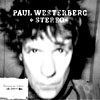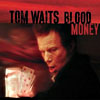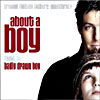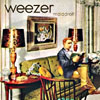
This Week: Paul Westerberg and Tom Waits return, Russell Gunn goes pop, Weezer rebounds and a couple of English lads score.
Paul Westerberg
Stereo/Mono (Vagrant Records)

There's a cadre of aging indie rock fans for whom the prospect of a new Paul Westerberg CD produces an odd mix of expectation and melancholy. We keep hoping that Paul, one-time Last Great Hope of Rock 'n' Roll, will come out with something that jolts us the way the Replacements jolted us in the 1980s. But we also know he won't, because he's not the Replacements anymore, he's not that young anymore, and neither are we. So we settle for what he gives us, which is usually just enough. (Of course, expectations drive perception; there are probably as many good songs here as on that new Wilco album, but it's hard not to think of Westerberg as unavoidably past his prime.)
Anyway, his latest effort is his strongest since 14 Songs, his solo debut. That is to say, plenty of lilting wistfulness and a good measure of chunka-chunka Stonesy rock. Those elements are divided neatly into two discs, with the wistfulness prevailing on the largely acoustic Stereo and the rock dominating Mono. On balance, Stereo gets the nod for better tunes and crisp home recording; the liner notes say the tracks were laid down "mostly live in the middle of the night," and Westerberg's voice has the weary register of a
2 a.m. phone call. His enduring themes—struggles with self-doubt and maturity, romantic longing and its discontents—are still front and center. He teeters between worn optimism and outright resignation, "Like Christopher Columbus in a world that's flat," as one verse puts it. The song titles give you a good sense of where he's coming from: "Got You Down," "No Place for You," "Boring Enormous," Nothing to No One," "Let the Bad Times Roll."
Given all of that, Mono provides a welcome dose of Westerbergian snarl. It's nice to know he's not too beaten to muster up a good put-down ("You oughta be a silent film star/ Keep that pretty little trap shut"). But after an initial brace of rockers that recall at least Cheap Trick if not the Replacements, the short collection settles into agreeable but unremarkable mid-tempo riff-rock.
It's hard not to notice Westerberg sounds liveliest on Stereo's two covers, the folk-gospel tune "Mr. Rabbit" and Flesh for Lulu's lost power-pop classic "Postcards from Paradise." Combined with his aching version of "Nowhere Man" on the recent I Am Sam soundtrack, they suggest that a whole album of other people's songs may be in order. I know at least a handful of aging indie rock fans who would look forward to it.
—Jesse Fox Mayshark
Tom Waits
Blood Money and Alice (Anti)

Tom Waits occupies a genre almost all his own, staking out a territory so completely that just about anyone else who goes there ends up being an imitator. It's eclectic hobo, junkyard carnival music married with smoky jazz and chamber pop. Waits' world is populated with whores, bums, working stiffs, alcoholics and lots of broken hearts and hopeless romantics. It is not really so much a gritty realism as it is a romantic vision of urban decadence, with elements of the Beatniks, pulp fiction, film noir, Walt Whitman and the Bible (mostly Revelations) mixed in. But it all feels real because Waits takes us so thoroughly into his world.

This year, he's given us two simultaneous slices of that world with Alice, a collection of songs written for a theater piece in 1992, and Blood Money, which features 12 new songs.
Both are solid recordings, although neither has the jubilant sense of adventure of his groundbreaking work in the mid-'80s, like Swordfishtrombones and Rain Dogs. Waits has found a comfortable niche writing ballads and noisy experimental pieces, and he uses that talent well.
Half of his songs are cynical and bleak, sometimes apocalyptic. Blood Money opens with two of them, "Misery Is the River of the World," and "Everything Goes to Hell," where he hisses: "I don't believe you go to heaven when you're good/ And everything goes to hell anyway."
The cynicism makes his other songs all the more touching for their sincerity and yearning. On the achingly beautiful, "All the World Is Green," he begs his wife to take him back: "Maybe when our story's over/ We'll go where it's always spring/ The band is playing our song again/ And all the world is green."
While Blood Money is schizophrenic in nature, Alice is dreamy and somber. Loosely based on Alice in Wonderland, the songs convey a surrealistic mood, but they're haunted by doom as much as wonder: "Everything you can think of is true/ the dish ran away with a spoon/ Dig deep in your heart for that little red glow/ We're decomposing as we go."
Now almost 52, Waits' vocals aren't as versatile as they once were (his Prince voice ain't what it used to be). But he continues to stretch as a musician. There isn't much guitar used on either album. He told The New York Times it was an attempt to go without the stabilizing effect that instrument so often has. It shows Waits' commitment to making weird, unsettling yet always beautiful music.
—Joe Tarr
Russell Gunn
Ethnomusicology, Vol. II (Justin Time)

Earlier this year trumpeter/ composer Gunn remarked that jazz would never attain Britney Spears-like popularity until provided the same marketing dollars. While this may be true enough, what Gunn neglects to mention is that jazz artists are exceptionally unwilling to bow to the marketing techniques those dollars are put to, most specifically subjection to the market's fickle dictates. I.e., no more making "the record I wanted to make," as stated in this recording's liner notes. Ms. Spears never had it so good (not that she'd know what to do with it if she had).
That said, the jazz record Gunn wants to make is manifestly of the rap/scratch/hip hop variety with a political edge—hence the CD cover photograph of Gunn as blackface marionette in front of a U.S. flag. And hence the sampling on the first tune, "Intro (aka I Think I Love You)": what might at first sound like the soundtrack from a Bruce Lee fight scene isn't; substitute a track of slaves being whipped. Hmmm...
Political intentions aside, there are some kickin' tunes herein, especially the hip-hop covers of jazz standards "Epistrophy," "Caravan," and "It Don't Mean a Thing" (where the bouncy stride piano works surprisingly well in context), with the highlight being the both sexy and funky take on Lalo Schifrin's "Del Rio (aka Anita)."
While sounding surprisingly commercial for the CD's packaging, the ballads "I Wish" and "Lynne's Joint," featuring Gunn on fluegelhorn, deserve smooth jazz airplay where they would be sure to raise the tone, a desirable upgrade to the routine pap but without causing aural offense.
—Jonathan B. Frey
Ed Harcourt
Here Be Monsters (Capitol)

Badly Drawn Boy
About a Boy Original Soundtrack (Artistdirect)
English boy-wonder Ed Harcourt first surfaced with the band Snug, which released a self-titled album in 1999. Here Be Monsters, his full-length solo debut, created a fuss in the U.K. last year. I know, I know, what doesn't create a fuss in the U.K.? But the attention is merited. Here Be Monsters is a dazzling pop album, fusing a number of obvious influences (Elliott Smith, Jeff Buckley, Radiohead, etc.) into something quite lovely and satisfying.
Harcourt has an ace ear for melody, a jubilant touch on the piano (actually, he played most of the instruments here, but the keyboards are what stand out) and a penchant for orchestral drama that only occasionally gets away from him. This is the kind of sad-bastard music Jack Black railed against in High Fidelity—a sensitive lad at the piano singing about "crimson tears" and "packed bags in the hallway" and "you look so beautiful and I look such a mess." But Harcourt's weary croon is shamelessly effective, and the strings and mournful trumpets come in at all the right times. Plus, there's the seven-minute epic "Beneath the Heart of Darkness," a post-grunge rewiring of "A Day in the Life" that builds to a squalling guitar bridge.

One of the people Harcourt immediately calls to mind is Damon Gough of Badly Drawn Boy, who's also back in the racks with the soundtrack to About a Boy. The album is considerably more playful than Gough's debut, The Hour of the Bewilderbeast, but it has the same assured pop smarts. There's a lot of bounce in the arrangements, which range from lite funk to music-hall cabaret. The major reference point is Paul McCartney, but Sir Paul hasn't written a clutch of songs this good in a dog's age. Even the instrumental film-score selections are pleasant filler, and best tracks—"A Peak You Reach," "Something to Talk About," "Silent Sigh"—are pure sing-along pleasure. This may not technically count as Badly Drawn Boy's sophomore album, but it leaves me looking forward to whatever does.
—Jesse Fox Mayshark
Weezer

Maladroit (Geffen)
Those infectious oohs and aahs are back. While less accessible than the previous self-titled "Green Album," and more accessible than the disastrous Pinkerton, Rivers Cuomo cranks out Weezer's best effort since their eponymous "Blue Album" debut release. Maladroit finds the band a year later, still socially awkward and full of self-doubt, but more comfortable musically. Cuomo dabbles in grunge, pop and punk to create an album of arena rock for the misunderstood. Weezer breaks the verse-chorus-guitar solo mold, in favor of less conventional song structures and unpredictable guitar noodling. On "Take Control," an anthem of empowerment for the dumped, Cuomo boasts "And I won't let you down, drag your name all over town, and I won't be comin' back around here no more." Influences are obvious and sprinkled throughout, with "Possibilities" echoing early Ramones. Maladroit is a blatant cash-in on the success of the "Green Album," but Cuomo takes a risk worth taking in producing an album that is stylistically different and not a carbon copy of the last effort. Weezer seems truly comfortable with their trademark sound and advantageous enough to gamble with it by taking the volume up a notch.
—Clint Casey

May 23, 2002 * Vol. 12, No. 21
© 2002 Metro Pulse
|